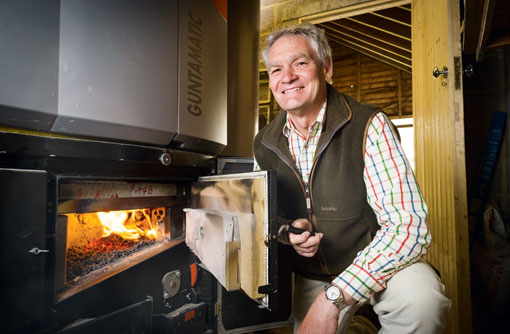Green Energy Farmer Award shortlist: Tim Barton

Pioneering new technologies and showing how varied a farmer’s skill set can be, this year’s Green Energy Farmer of the Year finalists demonstrate the many benefits of “energy farming”. Will Frazer uncovers three powerful voices committed to proving the many ways farmers can drive a greener and more prosperous society
Tim Barton
Manor Farm, Corsham, Wiltshire
Able to resist even the strongest winds of change, Tim Barton’s commitment to growing a greener business can only command respect.
Tim first trialled growing miscanthus in 2000 to supply heat for a rapidly expanding arable business and new country store. With a contract grain drying business processing 7,000 tonnes a year and an expanding feed processing mill, Tim knew he had to substitute the increasing energy demands of the business.
Diagnosed with cancer in 2003, Tim set about getting his house in order, held off his renewable energy ambitions and entered into a contract farming partnership with his neighbour.
Fortunately, Tim successfully recovered from a bone-marrow transplant in 2004 and, still calling the shots in the farm partnership, set about his renewable energy ambitions with renewed vigour.
His philosophy is all about adding value. “We first look to add value to the crops we produce and, second, to make the best use of the resources we have available,” says Tim.
With 80ha of “brash” land, he planted 30ha with miscanthus to fuel a 360kW boiler. This provides 473,000kWh of heat for use on site, saving 122 tonnes of carbon a year and is expected to payback in just over three years.
New markets for renewable heat then appeared in the form of Bical and a housing development adjacent to the farm requiring renewable heat. Some 80ha was planted with miscanthus, but then Bical went into administration and the housing market disappeared.
Never one to give up, with the arrival of the Renewable Heat Incentive, Tim changed tack. He leased a pelleting machine and started supplying biomass boilers to create demand for his new pelleted miscanthus fuel.
Two district-heating schemes now run adjacent to the farm, powered by 100kW and 50kW biomass boilers. Tim has developed a further 10 district-heating schemes in the local area, all of which run off his miscanthus pellets.
The added-value philosophy is perhaps best reflected through his roof space. Since the 1970s, Tim has harvested rainwater and he can now store 80,000 litres of water, which he uses for spraying crops.
In 2011, he further maximised the value of his roof space through installing a 50kW solar PV array, displacing 25% of imported grid electricity. He expects this to save the business 40 tonnes of carbon a year and pay for itself in less than six years.
Keen not to let his experience go to waste, he has held open days for 50-60 people to share his thoughts on the opportunities and challenges presented by energy crops. Renewable energy aside, Tim has not dropped the ball when it comes to greening his arable farming operations.
All sprays and fertiliser are applied using precision methods to reduce inputs. Six-metre margins surround his arable land and he’s increased the area of woodland on the farm by 50% to 8.3ha. All in all, Tim estimates to have cut the farm carbon footprint by 200 tonnes of carbon a year so far. But he certainly hasn’t stopped there.
The future for his “grow my own energy” business is bright. The housing development starts construction later this year, where he plans to install a combined heat and power plant, supplied with miscanthus from his farm and neighbouring growers.
And now a fully fledged farmer-come-retailer, he intends to sell the bio-char co-product of the CHP plant as a soil improver to the 38,000 customers that visit his store each year. Later this year, another 40kW solar PV system will be installed on a new grain store.
Tim’s focus is on simple but scalable solutions that maximise the assets he’s got. This attitude means he’s not afraid of investment. The scale of his ambitions may raise eyebrows but with his mantra for resourcefulness you can bet it’s money well spent.
“Everything we have done in farming is about adding value,” concludes Tim. And all the signs suggest he intends to keep it that way.
A word from our sponsors
 Marks & Spencer has been impressed with the quality and quantity of entries into this year’s Farmers Weekly Green Energy Award. This is another reminder that renewable energy production and agriculture are perfect partners with a robust economic case.”
Marks & Spencer has been impressed with the quality and quantity of entries into this year’s Farmers Weekly Green Energy Award. This is another reminder that renewable energy production and agriculture are perfect partners with a robust economic case.”
Hugh Mowat, Marks & Spencer, agronomist
See more
Meet the other 2012 finalistsFind out more about the 2012 Farmers Weekly Awards including details on how to books tables for the event’s glittering London awards bash
